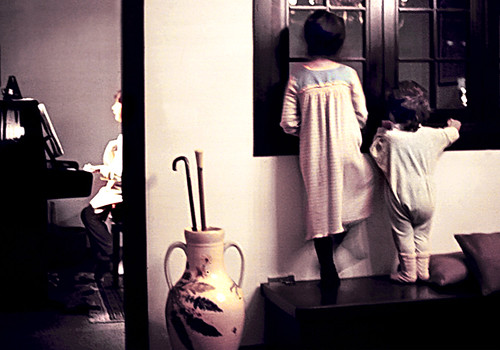This has been on my mind lately. It started with reading HP Lovecraft. The short version is that he was racist – even more so than expected for his time, but he still produced some great work. Some very thoughtful comments on that post led me to state this:
“Yes, his racism is ‘unfortunate’ to say the least, but I do believe that art stands beyond the artist. All humans have flaws great and small, and if we discounted every artist based on their personal problems we’d have no great art left.”
I believe that, but I believe it in shades of gray. I keep going back to it, turning the concept around in my mind, studying it from different angles. Is there a line? An exception? Does it vary for each consumer, for each artist, for each piece of art? I think it does. [For the sake of this post, I’m going to consider “art” any creative product. I’m not arguing merit or quality or semantics here; just product.]
I think that this is the reason that we study “context” when we study literature. It’s not just about the actual story; it almost can’t be. The time, place, and beliefs that the author was writing from change everything. Almost all antique literature is racist, for example, because almost all people being published more than a century ago were racist. The same goes for misogyny, classism, treatment of mentally ill people, etc. If we decide to hold artists accountable for their personal beliefs, that leaves us two options when it comes to our literary heritage: 1) get rid of all of it, or 2) get rid of all of it where those beliefs were expressed.
I’m not okay with that. Are you?
So if we allow that art can be based on its own merit apart from that of the artist, what are the exceptions? Perhaps when the negative beliefs can’t be attributed to the creator’s time/background. (That would knock out Lovecraft. Again, I’m not okay with that.) Perhaps when their actions cause ramifications in the real world? There are some chillingly beautiful portions of Mein Kampf, for example, but to study that work without attaching the context would be absurd. What about a less global example, such as A Clockwork Orange? That gets into my old topic of reader vs. writer responsibility. Where’s the line?
A different example is modern popular art. Celebrities. Don’t we judge every contemporary movie, TV, and music star based on their work combined with their public (and often private) lives? Does the racist outburst make Mel Gibson’s movies less worthy? Does it make Paula Deen’s cooking less tasty? I’m not being tongue-in-cheek; I’m really asking. Does it? Can it? And is that fair? And what about drug and alcohol abuse? Clothing? General morals?
Sometimes their personal beliefs change our interpretations of their work, even if those beliefs aren’t apparent in certain works. I’ve been faced with the question recently in deciding whether or not to submit a story to a venue sponsored by someone who publicly denounces a group of people I support. Should their choice to be vocal about their beliefs affect my estimation of their work, their reputation, my potential association with it?
Which brings up another complication: how many other markets and artists that I support go against my values without my even knowing it? Sure, we can condemn those who are vocal about their beliefs, but how many people privately believe the same things? Does public announcement change the game? What if that publicity was unintentional? In other words, should we judge someone more or less harshly if they meant to come out for or against something than if they never intended to get involved in the debate? It might be easy, as a consumer, to say yes: judge away. As an artist, the thought of my art being judged on my beliefs even if they are irrelevant to my work is disturbing.
As I mentioned, this goes beyond ‘art’ in the strictest sense; this expands into product. There’s been a lot of hullabaloo lately about companies coming out in support or denouncement of various causes, and many consumers are basing their consumption choices on those public declarations. (Chick-fil-a, JC Penny, Papa Johns.) Do beliefs hold a place in products that have nothing to do with them? Or in practices that produce them? What would the world look like if people only bought art from companies whose beliefs they agreed with?
I don’t have the answers. I suspect this topic is a little too broad for a single blog anyway. I do believe, though, that art can stand apart from the artist. I believe that sometimes it can’t. I also think there’s something in between, where one can censure the artist – or some portion of them – and still value the art.
What do you believe?
Share this:

